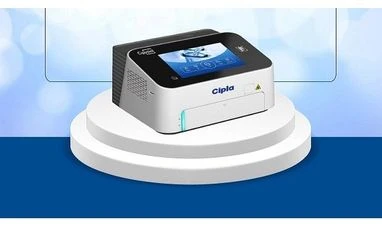Never again will India be starved of essential drugs, says Cipla founder
As of July 27, Cipla's market cap stands at Rs 94572 crore
)
Listen to This Article
“Never again will India be starved of essential drugs,” Cipla founder Dr Khwaja Abdul Hamied famously said.
His next generation ensured the world never lacked access to essential medicines.
His son, the iconic Yusuf Khwaja Hamied, a PhD in organic chemistry from Cambridge University, joined Cipla as a research officer after his father died in 1972. He became managing director (MD) in 1976.
Also Read
Yusuf, now 87, was both famous and infamous for his tirade against giant drug innovators as he sold expensive AIDS drugs cheaply in Africa. His copycat drugs shaped the future of Indian pharma, which rose to become a global generic (copycat) drug manufacturer.
One in every six pills consumed anywhere in the world today is made by an Indian firm.
Yusuf was worshipped in Africa because he sold AIDS drugs at one-tenth of their price. People who know him say that the Hamieds were never ‘wealth-minded’.
“They used to say ‘share certificates are like toilet paper’. Hamieds, and particularly Yusuf, wanted to leave behind a legacy. If they are at all considering a stake sale now, it could be for philanthropic reasons for all you know,” said someone who has closely worked with the Hamied family.
Cipla started its journey around 1935, and it crossed a turnover of Rs 1 crore for the first time in 1968. The past four decades have seen tremendous growth for this pharma giant; from a meagre turnover of Rs 85 crore in 1989-90 (FY90), it breached the Rs 1,000 crore mark in 2002 (Rs 1,275 crore). In 2022-23 (FY23), Cipla clocked a turnover of Rs 22,753 crore. Its networth swelled from Rs 19 crore in FY90 to Rs 23,408 crore in FY23.
As of July 27, Cipla’s market capitalisation stood at Rs 94,572 crore.
After Yusuf decided to hang up his boots and end his 37-year-old innings as MD in 2013, the succession planning started in 2011 when Samina Hamied, a third-generation scion at Cipla, was groomed for the top post along with her brother Kamil Hamied (son of Mustafa Hamied, Yusuf’s brother). Four years later, Kamil stepped out, leaving Samina to take on the legacy of a 75-year-old company.
In a chat with Business Standard, Samina said last year, “When I joined the company, it was at this inflexion point for transformation... What would it take to create the next 75 years of magic?”
MD and Global Chief Executive Officer Umang Vohra had said that when he joined Yusuf Hamied, he wanted him to be clear that he had built this organisation for patients only.
“If you come back to me and say that our Ebitda is now 25 per cent, but I have lost the soul of the company in doing it, I am not going to be happy. Numbers are important — quarters come and quarters go, but I created this organisation for patients, and it is going to remain that way,” Vohra reminisced in an earlier chat with Business Standard.
More From This Section
Topics : Cipla
Don't miss the most important news and views of the day. Get them on our Telegram channel
First Published: Jul 27 2023 | 10:07 PM IST
